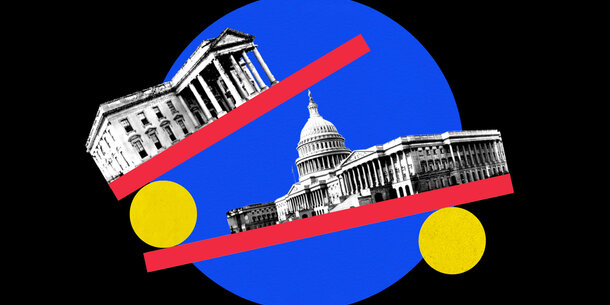1. Reducing Harms
Some of the most egregious forms of disinformation should be addressed at the source. For instance, certain ways that bad actors use disinformation to interfere with the right to vote or threaten and intimidate election workers should not be allowed at all, and reforms can reduce incentives for some spreaders of disinformation.
Lies about voting that are designed to trick people out of using the franchise, like “Text # to vote,” threaten the right to vote and disproportionately target communities of color. The federal Deceptive Practices and Voter Intimidation Prevention Act would ban these lies and dedicate law enforcement resources to protecting voters.
Much of the disinformation surrounding the 2020 election was generated by political actors using “Stop the Steal” and similar election-fraud narratives. Trump and others sent fundraising solicitations implying that donations would go to legal challenges to the election results, when in reality the money will largely be dedicated to future political campaigns. Campaign finance laws should restrict these types of appeals, requiring, for instance, that funds raised ostensibly for legal fees to challenge results can only be used for legal challenges.
Party-appointed monitors of ballot counts were a significant source of false information about the process in 2020, some inadvertently. States should pass laws requiring these monitors to be trained about election processes, so they know what they are observing, and held accountable for their behavior so that they do not disrupt vote counts and other election work.
Social media platforms have vast power to help to slow the spread of disinformation but have not done enough. Disinformation about elections is particularly harmful, infringing on voting rights, undermining faith in elections, and threatening the foundations to our democracy. Thanks largely to lies spread by figures with large followings, election officials are increasingly being threatened for doing their jobs. One in three fear for their safety. The worst spreaders of dangerous election disinformation are readily identifiable. If social media companies are not willing to take down those accounts, one intermediate sanction would be to delay publication of all of posts by accounts that have violated clearly articulated rules and been warned by the platform. This “holding area” strategy would act to disrupt the virality of certain claims and would give platform fact-checkers the chance to block some lies before they are published.
In addition, platforms should moderate content from public figures in accord with their power to influence people — meaning more strictly than the average user, not less, as Facebook and others currently do. And social media platforms should track disinformation and actively send corrective information to users who interacted with false messages about how to vote and other election processes.

